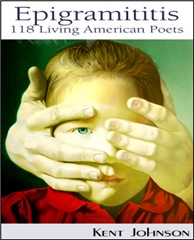
Brian Richards reviews
Epigramititis: 118 Living American Poets
by Kent Johnson
Publisher: BlazeVOX (2006) Paperback: 266 pages, ISBN:0975922785
This review is about 3 printed pages long.
The strong accent, I take it, occurs on the antepenult.
The epigram is prized for its acute brevity, made thereby secure from discourse and concomitant argument. At its apogee, it descends into the dozens.
Archilochos: A wild fig tree that feeds only crows,
you spread your limbs for strangers.
Akhmatova: I taught women to speak out…
But, Dear God, how to shut them up?
In the intro to Stephen Jonas’s indispensable Exercises for Ear, Gerrit Lansing — and how poor would we be without him? — quotes Puttenham’s definition of the epigram from The Arte of English Poesie: “in which every mery conceited man might without long study or tedious ambrage, make his friend sport, and anger his foe, and give a pretty nip, or show a sharp conceit in a few verses… .” The definition continues, as does Lansing, who points out that vernacular is the medium and that “without long study” here means in the absence of premeditation, not without years immersed in poetic resources.

Dale Smith, in his introduction, calls the pieces in this book “evaluations of certain poets” and the poems do have a calculated air. The select — out of how many? — 118 were chosen for personal reasons made public, which is the nature of epigram, and Johnson’s have little to do with evaluating them as poets — many of the best are absent — but rather as public persons.
Since they generally satisfy those conditions — acute, brief, merry, public — I took pleasure in Kent Johnson’s explorations of the form despite being unfamiliar with the work of at least half of the poets: some unknown to me, others studiously avoided after initial exposure.
§
The universe is distinguished by the indubitable fact that there is something rather than nothing. Portions of that something can be arranged for a variety of motives. Of these, poetry is a patterned integrity of uncommon durability, connecting, as an instance, Archilochos and Akhmatova. What form have we older than song, coeval with Lascaux, its complexity substantially intact? One example might be the wisecrack.
On NPR poetry is represented as a harmless hobby enjoyed by insurance executives who drone unendingly about its relative unimportance, although they allow that it may create, for some inchoate reason, fierce joy in even such men as they manifestly are. For the student, current poetry is the province of the glib, floaters, who use it to advance a point of view that is always sentimental, even in its brittlest sarcasm. In the preface, Johnson alludes to poetry as a postmodern career path, the domain of some with the wit to prize a labor-free dollar but insufficient ambition to go for the jack pot. It is unlikely the perturbations of the waters he has raised will give those so employed much discomfort, let alone carry them under, but the ensuing chum may divert bottom feeders.
§
Kent Johnson has used his enormous energies to create whirlpools among the congeries of schooled poets currently thrashing about in the Anglo Ocean, including among his works translations and anthologies from Latin America and Russia, along with anthologies of poems influenced by Buddhism and against the war in Iraq, as well as his transmission of the corpus of Araki Yasusada. Doubled Flowering alone merits the gratitude of all those who find authority in the text: there is the work safe from the confounding of poem and author; only there can we avoid the cult of personality ever at work, like Canute, in opposition to the rising tide. It is possible to make the value of a poem dependent on the history of its poet only if considerations beyond those intrinsic to poetry are conclusive. Biography is critical in nature, easily bent to the will of the critic. Integrity resides in the poem, not in the life stories of the poet.
Johnson steps past fictional character here, praising living writers he admires and dissing the rest, putting the tag of “poet” on each, not unlike D.O.A. tape on the big toe. How chillingly apposite to see Billie Holliday verso to Steve Ellis. What could biography tell us against the decisive sum: that Eshleman, reeking of shit, still projects the Orphic figure, that Merwin is our Tennyson; that Snyder has grown unendurably pompous; that Antin needs a quiet pill and the rest of us a nap rug; that Helen Adam lives in her poems?
What relation these characterizations have to truth is not at all the point. It is good to be openly snide. This is not the big tent. These are the palpable hits. They cannot drive the moneychangers from the temple, but they can allow the native to declare himself beyond the colonial pale.
§
Cavils: the Language Poets aren’t Cavaliers; they’re Roundheads; Howard McCord is a Cavalier. And Dale Smith and the author to the contrary notwithstanding, neither molecular nor astro-physicist is ever comprehensive. Consolation is more likely to be of use than is comprehension. The notion of a Final Theory is paltry next to ‘Prometheus Unbound’ or ‘This Is Just to Say’ or ‘The Land Below’. Or ‘The Finger’. Or ‘Safe in Their Alabaster Chambers’ or ‘Wintergreen Ridge’ or ‘Midwinter’s Day’ or ‘At Night the States’. Need I go on?
No, I am only looking for poems to read. There is room there for the personal. I, too, miss Joe Napora.
July 17, 2006
Brian Richards, who lives in the forest overlooking the Ohio River, is the author of a half dozen poetry chapbooks. He operates Bloody Twin Press, which publishes handmade books of contemporary poetry. His novella, In Rain, is appearing serially in House Organ.